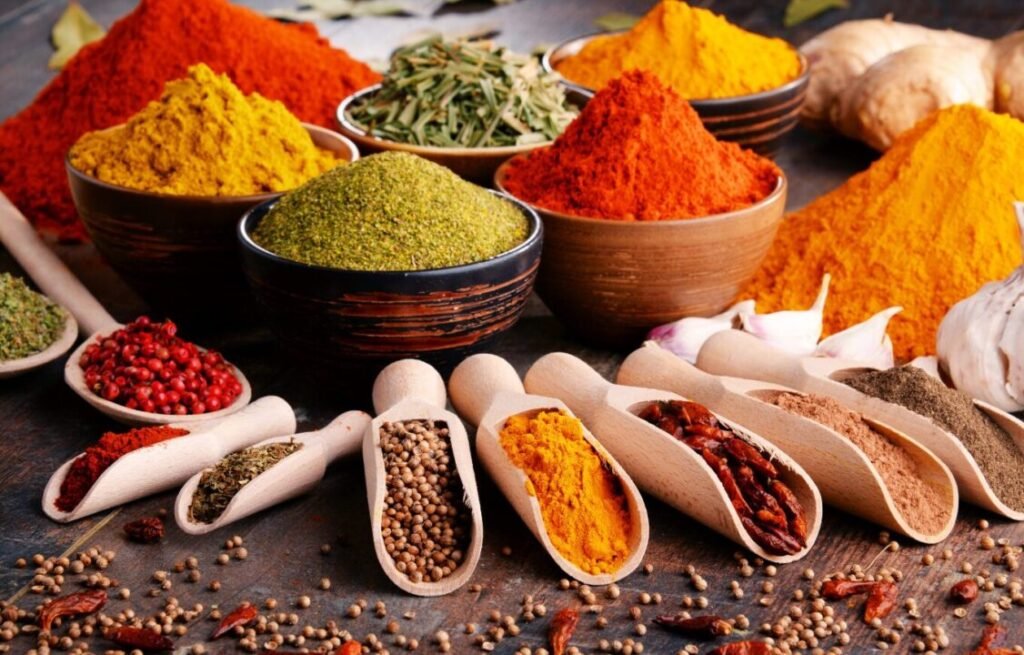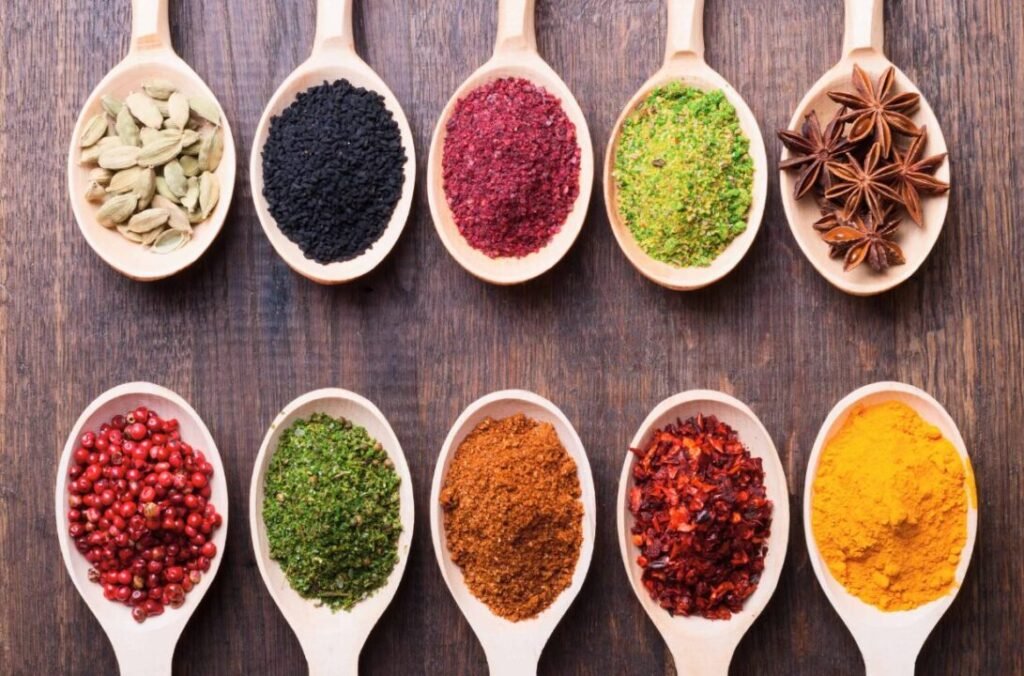Uncover the mysteries of spices
Did you know spices once served as currency and symbols of power?
They held strategic importance in ancient wars for their healing properties and preservation abilities. Originating from rich cultures like Sri Lanka and India, spices have deep mythological significance — some believed to possess supernatural powers.
Across the globe, popular spices like cinnamon and turmeric have unique flavors integral to various culinary traditions.
The world of spices is vast and full of surprises, inviting you to explore further into their fascinating history and diverse uses.
The Ancient Spice Trade Routes
Exploring the ancient spice trade routes can lead you on a fascinating journey through history, revealing the intricate networks that connected civilizations across the globe.
Ancient trade wasn’t merely about the exchange of goods but also facilitated cultural exchange, shaping societies and economies. The spice routes were vital pathways that allowed the flow of exotic spices such as cinnamon, pepper, and cloves, among others.
These routes weren’t just about commerce; they were conduits for the exchange of ideas, beliefs, and technologies, enriching the lives of people along the way.

The historical significance of the spice routes can’t be overstated. They played a pivotal role in shaping the course of history, leading to the rise and fall of empires, the blending of cultures, and the evolution of global trade. The spice routes were instrumental in connecting the East and the West, fostering relationships that transcended geographical boundaries.
This ancient trade network laid the foundation for the interconnected world we live in today, showcasing the power of trade in shaping human civilization.
Spices as Currency and Status Symbols
Spices held significant value beyond their culinary uses, serving as symbols of wealth and status in various ancient societies. In ancient times, spices weren’t only prized for their ability to enhance the flavors of dishes but also for the prestige they brought to those who possessed them.
Spice hoarding was a common practice among the elite, with some spices being so rare and expensive that they were considered more valuable than gold.
In societies where spices were scarce and difficult to obtain, owning a collection of exotic spices became a way to showcase one’s affluence and social standing. The possession of certain spices signified not only access to luxury goods but also a demonstration of power and influence.
Culinary prestige was closely linked to the variety and quality of spices one had in their possession, with elaborate feasts and meals showcasing the wealth and sophistication of the host.
Through the centuries, spices have continued to be associated with status and opulence, their allure transcending mere culinary enjoyment to become symbols of luxury and exclusivity in various cultures.
Secret Health Benefits of Spices
Uncover the hidden potential of spices in enhancing your well-being with their secret health benefits.
Spices aren’t just culinary delights; they also possess remarkable healing properties that have been utilized for centuries. From fighting inflammation to boosting immunity, these flavorful additions to your meals offer more than just taste.
Cumin, for example, isn’t only a staple in many dishes but also known for its digestive benefits.
Turmeric, with its active compound curcumin, is a powerful anti-inflammatory spice that may aid in reducing the risk of chronic diseases.

Cinnamon can help regulate blood sugar levels, while ginger is celebrated for its ability to alleviate nausea and support digestion.
Incorporating these spices into your daily meals not only enhances the flavors but also provides a natural way to promote your overall health.
By understanding the dual nature of spices – their culinary uses and healing properties – you can elevate your dishes while also nurturing your body from within.
The Role of Spices in Wars
Amidst the chaos of conflicts and the clamor of battlefields, the strategic significance of spices has often played a covert yet influential role in shaping the outcomes of wars throughout history.
Spices have been coveted for their ability to enhance food preservation, provide sustenance, and even serve as a form of currency in times of scarcity during military campaigns.
Spice espionage, a clandestine practice, has been utilized to gain an upper hand by controlling the spice trade routes or obtaining secret recipes that could provide military advantages. Nations and empires have gone to great lengths to secure their sources of spices, leading to the exploration of new territories and the development of military strategies centered around spice-rich regions.
Moreover, spices have been used not only for their culinary appeal but also for their medicinal properties, which have played a role in boosting the morale and health of soldiers on long campaigns.
Understanding the value of spices in warfare sheds light on the intricate web of connections between trade, power, and conflict throughout history.
Mysterious Spice Origins Unveiled
Explore the mysterious beginnings of these exotic flavor enhancers, following their path from faraway lands to the core of culinary traditions worldwide.
Spice cultivation dates back thousands of years, with spices like cinnamon and black pepper originating from regions such as Sri Lanka and India. These spices were highly prized and played a significant role in trade routes, shaping economies and influencing cultural exchanges.
The cultural significance of spices goes beyond their culinary uses; they were symbols of wealth, power, and prestige in many ancient societies.

Ancient civilizations like the Egyptians, Greeks, and Romans valued spices not only for their ability to enhance food but also for their medicinal properties and religious rituals. The allure of spices led to expeditions, discoveries, and conquests, as explorers sought to uncover the sources of these prized commodities.
As spice trade routes expanded, the exchange of flavors and knowledge between distant lands enriched culinary practices across the globe, creating a tapestry of diverse cuisines that reflect the interconnected nature of human history.
Spices in Mythology and Folklore
Spices have long held a fascinating presence in the domains of mythology and folklore, intertwining with ancient stories and beliefs to enrich cultural narratives worldwide.
In various cultures, spices weren’t merely ingredients but carried deep symbolic meanings in rituals. For instance, cinnamon symbolized wealth and prosperity in ancient Egyptian rituals, while saffron was associated with purity and fertility in Hindu ceremonies.
The use of spices in such contexts highlighted their significance beyond culinary purposes, showcasing their role in spiritual and symbolic spheres.
Moreover, spices were believed to possess supernatural powers in many mythological tales. Cloves were thought to have protective qualities against evil spirits in European folklore, and nutmeg was considered to bring luck and ward off illness in Asian traditions.
These mystical attributions to spices added layers of intrigue and mystique to their already exotic nature, making them not just flavors, but carriers of ancient wisdom and magic across diverse cultures.
Modern Spice Innovations and Trends
In the world of culinary advancements, modern spice innovations and trends continue to captivate chefs and food enthusiasts alike with their dynamic flavors and creative applications.
Spice infused cocktails have become a popular trend, blending traditional mixology with the bold and complex profiles of spices. From cinnamon and cardamom to chili peppers and star anise, these cocktails offer a unique sensory experience that tantalizes the taste buds.
Moreover, spice-inspired cuisine trends are on the rise, with chefs incorporating an array of spices into their dishes to elevate flavors and create memorable dining experiences.

Whether it’s the smoky depth of cumin in a savory stew or the aromatic notes of saffron in a creamy risotto, spices are taking center stage in modern cooking.
Embracing these modern spice innovations can add a fresh perspective to your culinary creations, allowing you to experiment with different flavor profiles and explore new horizons in traditional cooking.
So, next time you’re in the kitchen or at a cocktail bar, don’t hesitate to delve into the world of spices and discover a realm of delicious possibilities.
Last Words
Now that you’ve uncovered the secrets of spices, you may never view your spice rack the same way again.
From their ancient origins to their modern innovations, spices have played a fascinating role in shaping history, culture, and even health.
So next time you sprinkle some cinnamon on your oatmeal or add a pinch of turmeric to your curry, recall the rich and diverse stories behind these flavorful ingredients.
Happy spicing!
